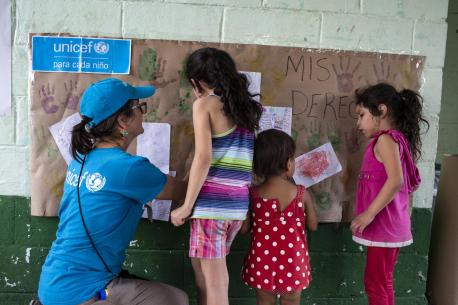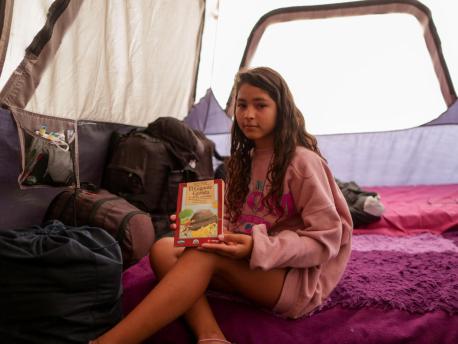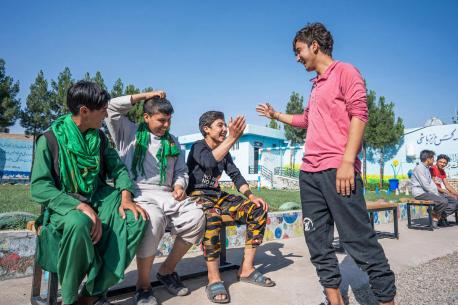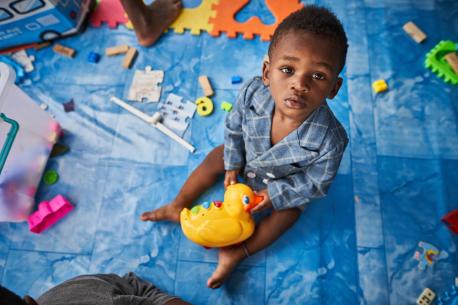
UNICEF USA and Save the Children Urge Protection of Migrant Children
We call for increased U.S. Government support to improve COVID-19-related prevention and mitigation responses for migrating children & families.
UNICEF USA, SAVE THE CHILDREN AND SAVE THE CHILDREN ACTION NETWORK JOINT POSITION ON U.S. SOUTHERN BORDER RESTRICTIONS DUE TO COVID-19
World’s leading children’s organizations call for increased U.S. Government support to rapidly and significantly improve COVID-19-related prevention and mitigation responses for migrating children and families
As organizations committed to the survival, development, and protection of children in the United States and around the world, UNICEF USA, Save the Children and Save the Children Action Network are deeply concerned about the health and protection of children and families who are being denied asylum and other protections due to coronavirus-related border restrictions and policies.
Along with current border closures in response to COVID-19, children are being summarily turned away or deported from the southern U.S. border without opportunities to make asylum claims with due process. Those who are provided with the opportunity are placed in harmful detention facilities. Additionally, children arriving at the border are not tested for COVID-19 and their returns pose grave public health and child protection risks for a region already severely limited in sanitation, shelter capacity, health services, and child protection systems. These practices leave children in hazardous conditions and they violate international law – including the international principle of non-refoulement, which forbids governments from forcing refugees or asylum seekers to return to a country in which they are subjected to persecution.
The entire world must cope with this dangerous pandemic, and we understand that enhanced border restrictions and other emergency policy provisions may be part of a government’s response. However, when countries choose to implement border restrictions in an effort to contain the spread of COVID-19, it is critical that such measures be implemented in a non-discriminatory manner, in line with international law, and prioritize the protection of the most vulnerable, especially children. Regardless of border restrictions, asylum seekers have a right to seek international protection and must not be returned, either directly or indirectly, to a country where their lives or safety are at risk. This is not just a matter of international law, but of American conscience. The U.S. Government is fully capable of taking measures to slow this pandemic without putting children at extreme risk. It must employ policies that put forth the best interest of all children, regardless of migration status.
UNICEF USA, Save the Children and Save the Children Action Network also believe that any migration enforcement policies and practices must be compatible with effective public health strategies. Governments should provide information on how to prevent transmission of COVID-19, in languages and formats accessible to all, and also ensure access to testing and treatment for anyone in its custody. Uprooted children and families should be moved quickly out of harm's way to adequate accommodations where they have access to water, soap, physical distancing, education and safety.
In addition, we strongly urge the U.S. Government, at a minimum, to implement the following policies immediately:
- Resume asylum processing by appropriately trained personnel, such as those who are trained to interview children in a trauma-informed manner.
- Provide all migrants at the U.S. border with appropriate health screening, testing and quarantine protocols — especially unaccompanied migrant children who are afforded special protections under the Trafficking Victims Protection Act — ensuring that such protocols protect children’s psychological and physical health, and take into account child safeguarding measures.
- Temporarily suspend all deportations given that receiving countries cannot guarantee the protection, health, and safety of returnees, especially children.
- Increase U.S. Government support to rapidly and significantly improve COVID-19-related prevention and mitigation responses in Mexico and Central America, including implementing such measures as mandatory quarantine, safe transport to communities of origin, support for interventions to prevent or respond to the transmission of COVID-19, and information for receiving families about COVID-19.
- Ensure that all migrant children and families applying for asylum, including those currently in detention facilities, be promptly released into non-custodial alternatives to detention, while following strict safeguards to prevent and respond to COVID-19. Such releases should be in coordination with community-based actors to ensure children and families access critical essential services.
As the United States and the world at large confront this unprecedented crisis, we cannot allow fear to undermine human rights, put children at risk, or compromise the effectiveness of country responses to the global pandemic. The health of our children is only possible when each and every one of us is protected.
UNICEF USA, Save the Children and Save the Children Action Network will continue to monitor this situation closely and advocate on behalf of the world’s most vulnerable children.
HOW TO HELP
There are many ways to make a difference
War, famine, poverty, natural disasters — threats to the world's children keep coming. But UNICEF won't stop working to keep children healthy and safe.
UNICEF works in over 190 countries and territories — more places than any other children's organization. UNICEF has the world's largest humanitarian warehouse and, when disaster strikes, can get supplies almost anywhere within 72 hours. Constantly innovating, always advocating for a better world for children, UNICEF works to ensure that every child can grow up healthy, educated, protected and respected.
Would you like to help give all children the opportunity to reach their full potential? There are many ways to get involved.





